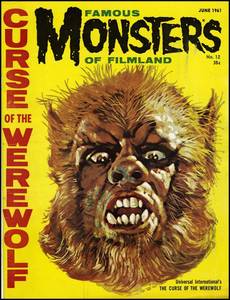
An issue of Famous Monsters magazine, which Mr. Johnson referred to as material he read as a child and what initially grabbed his interest in the subject matter
I recently spoke with A. Randal Johnson, who is a past author for Film Matters magazine, about one of his particular articles he wrote for the magazine. Mr. Johnson was a part of the guest editorial board for the magazine in the spring of 2012, while he was attending the University of Kansas. He went on to write the article “Monster Kids Spawned in the Atomic Age,” which made issue 3.3 of Film Matters. After reading this, I learned that this was an intimate piece of writing by Mr. Johnson, as it related to his personal interests as a child and how he grew up in the subject matter. I contacted A. Randal Johnson to get a better understanding of his writing style and form and how he incorporated his personal references to create a strong featurette.
Jackson Gentry: I noticed in your article how you used several personal experiences; do you believe that by doing this you are able to relate more with the reader?
A. Randal Johnson: Not particularly, this article just happened to be from my personal point of view. The point of the article was to show “How I became a Monster Kid” by the zeitgeist I was born into, by osmosis of the popular culture.
JG: What are ways to create an energetic, compelling introduction that draws in the reader instantly?
ARJ: In my case what I look for is: first, is it a subject that grabs my interest? Usually this is imparted in the first sentence, and fleshed out in the first paragraph. In a thesis like “Monster Kid,” you are trying to prove an argument. Usually if you can entertain yourself anyone else interested in the subject will be entertained also.
JG: In writing a multiple-page article, would you say short descriptives work more efficiently compared to longer paragraphs of information? Why?
ARJ: Using one of the subjects of the article, monster film magazines, I used to read Famous Monsters when I was a kid; but by the time I was in my teens the simplicity of the articles, which were little more than captions for the pictures, no longer interested me, I wanted more depth, and switched to Starlog, Cinefantastique, and Fangoria, because they were targeting an older audience. Not everything is written for everybody. I have never been able to get through a whole issue of Omni magazine because it is just too intellectual for my tastes. Always know your target audience.
JG: What are other ways to make an article more enjoyable for the reader other than using personal references?
ARJ: Again, that goes to target audience; in my case, I am not a professional writer so would refer you to a pro or one of your writing professors.
JG: Do you feel that the science fiction genre regarding monsters has strayed away from the core that was built by Forrest J. Ackerman and others of this time?
ARJ: As the media has changed along with tastes in pop culture, so has the fan culture. As with everything else published, print media is all but deceased. Most of the monster culture magazines that are left are published regionally, and attached to fan websites (they did bring back Famous Monsters a few years ago and Fangoria is still going strong). However science fiction and horror are more popular than ever. When I was a kid you salivated with anticipation for your next Fantastic Films fix; they were few and far between until Star Wars hit in the mid-seventies, and Fantastic Films blew up. Now with all the streaming media, there is so much content you could watch horror and sci-fi all day, every day and not be able to keep up with it all. I know, I’ve tried. Of course the Monster Kid life is not everyone’s cup of tea; some kids’ parents, like my best friend’s, thought it was odd even back in the day, and kept trying to get him into baseball and Boy Scouts. I think what they now call the “geek” lifestyle is way more accepted — look at the domination of the comic book film, something else that was frowned on in my youth. Luckily for me, my father was a fan of Fantastic Films also. Between the proliferation of fan culture on the web and my generation’s passing on our love of the genre to our kids, heroes of the culture like Forry J. are even better known now than in the past.
Author Biography
Jackson Gentry is from North Carolina and attends the University of North Carolina in Wilmington as a film major. He has lived in all three geographic sections of North Carolina and is an avid fan of the Charlotte Hornets and the North Carolina Tarheels. He enjoys many different forms of art, but recently he has found an interest in film and writing and is currently considering a career path in such.



































